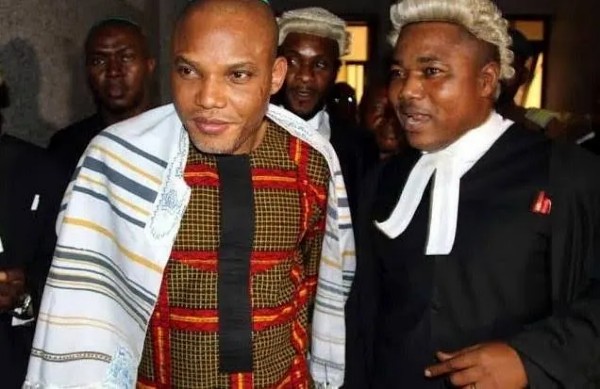
Leader of the Indigenous People of Biafra, IPOB, Mazi Nnamdi Kanu has been discharged and acquitted by the Court of Appeal of the terrorism charges levelled against him by the Federal Government.
Court of Appeal sitting in Abuja on Thursday discharged Kanu, of the terrorism charges, heaping the blame on the recklessness of the executive arm of government.
A three-man panel led by Justice Jummai Hannatu, from Gombe Division, gave the judgment.
Kanu’s Appeal No: CA/ABJ/CR/625/2022 asked the appellate court to quash the remaining seven count terrorism-related charges filed against him.
Recall that Kanu was arrested by security operatives on 14th October 2015 on 11 count charges bordering on treasonable felony, illegal possession of firearms, and improper importation of goods.
The case dragged on for years with the prosecution amending the charges five times.
Kanu had fled the country following a military invasion of his home country in Abia state but he was later rearrested overseas and extradited to Nigeria to face trial.
Justice Binta Inyako of the Federal High Court Abuja had on the 8th of April, 2022 struck out 8 out of the amended 15 counts of terrorism-related charges against Kanu for largely being repetitive.
The lower court judge however retained 1,2, 3, 4, 5, 8, and 13 of the counts.
Kanu’s lawyer, Chief Mike Ozekhome SAN, approached the Court of Appeal seeking a vacation order against the entire case at the trial, arguing that his client cannot be tried on an offense where the place it was allegedly committed was not stated by the federal government.
He asked the appellate court to determine Whether the extraordinary rendition of Kanu without any form of a court hearing in Kenya allows him to be tried in Nigeria on any charge.
But D. Kaswe, Assistant Chief State Counsel from the Chambers of the Attorney-General of the Federation, had urged the appellate Court to dismiss the appeal for lacking in merit because Kanu was brought back to Nigeria by due process of law.
On extradition, the panel on Thursday observed that the lower court held that the struck-out charges did not disclose any offense and was repetitive but decided to proceed on the remaining charge.
The panel held that once jurisdiction is raised, it must be determined first because it can affect the entire case.
“It is clear that where a court lacks jurisdiction to determine a matter, every other thing it does will amount to a nullity,” the panel said.
Oct 4, 2022
The court observed that there was no specific response from the federal government on where Kanu was extradited from.
The panel held that FG remained “silent” on the allegation that Kanu was abducted from Kenya.
“I thus agree with Ozekhome”, a member of the panel said, adding that FG’s refusal to state where Kanu was extradited means it is “deemed conceded by the federal government.”
The panel said the United Nations Convention states that an Extradition request shall be in writing and accompanied by a warrant of arrest to the host territory where a suspect is domiciled.
“It is clear that the respondent having removed Kanu from a country without trial constitutes a fundamental violation of his right,” the court said, adding that Kanu can only be returned from another country after being subjected to judicial process in the host territory.
The appellate court also faulted the lower court saying that the warrant of arrest only applies within Nigeria but extraordinary rendition without formal trial in a transferring country is an error.
“There is a duty of this country to conform with international laws and legal framework,” the panel said.
The panel said that on Kanu’s extradition, the federal government clearly violated international laws which it was bound to obey.
The appellate court also said that since law enforcement cannot show how and where Kanu was extradited,” the whole proceeding is tainted.”
The panel said the court must not shy away from calling the executive to order when it operates in “executive recklessness”
In its judgment, the appellate court held that the lower court failed to look at the facts of Nnamdi Kanu’s extradition.
“I hold that the respondent is restrained from holding Kanu in detention,” said the member of the panel, noting that the lower court has no jurisdiction to try Kanu on the remaining charges.
On the Proscription of IPOB, the appellate court held that the lower court order proscribing the secessionist group stands till it is vacated by the higher court.
This court said that Kanu’s appeal succeeds, it faulted Justice Nyako’s decision to go ahead with the trial, adding that “the remaining charges against Kanu are set aside and the defendant is discharged.”




